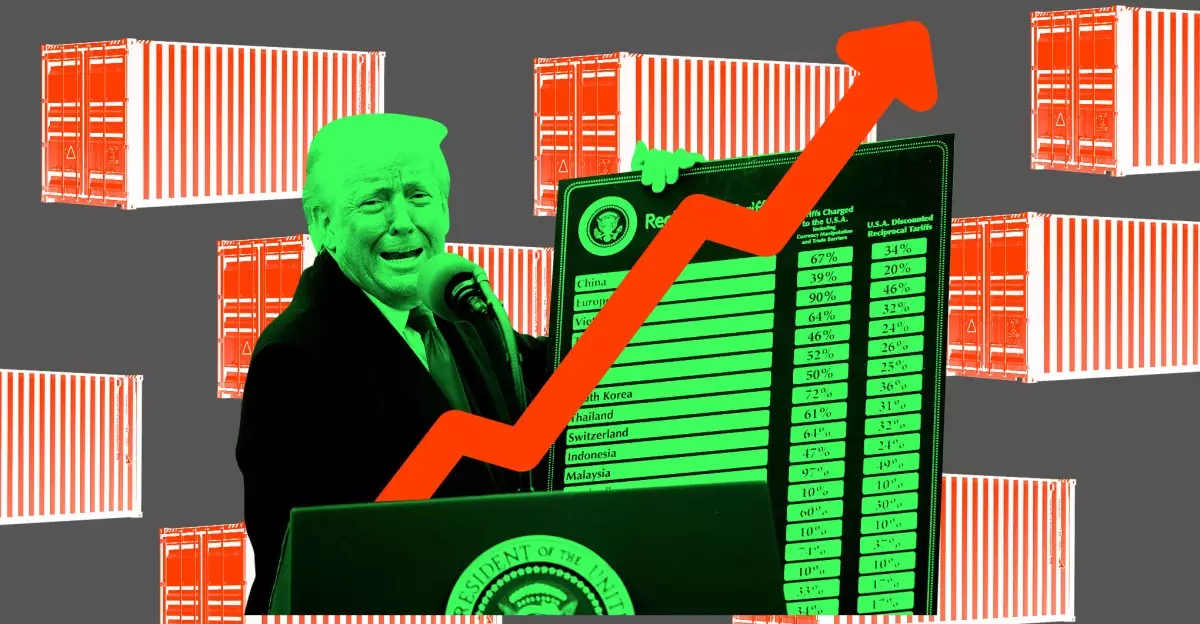The tech industry has often positioned itself as a bastion of innovation and progress, yet recent events reveal a stark reality—this beacon of modern capitalism is caught in the crosshairs of geopolitical tensions. The U.S. administration, under the newly emerging political climate, has put major players like Meta, Apple, Tesla, and TikTok in an exceedingly precarious position. As companies that have often enjoyed unimpeded growth and influence, the painful paradox is that they now serve as pawns in a complex game of international trade warfare. What began as a hopeful relationship with President Trump has abruptly transformed into a battlefield where these tech giants face potential fallout from stringent tariffs and regulatory scrutiny, especially from the European Union.
The EU’s Threat: A New Toll for Tech Giants
The recent comments from European Commission President Ursula von der Leyen underscore a significant shift in the dynamics between the U.S. and its European allies. The suggestion to impose a levy on the advertising revenues of digital services signals that Europe is ready to turn the screws. For CEOs like Mark Zuckerberg, who once believed their support for the Trump administration would deliver favorable outcomes, this represents a crushing disappointment. Rather than having a staunch ally in the Oval Office, they now confront an adversarial landscape that threatens to sap their financial resilience. The EU’s decision to penalize companies like Meta and Apple under the Digital Markets Act adds fuel to a fire that these corporations had hoped to extinguish through political favor.
Elon Musk’s relationship with the political zeitgeist has taken a turn, as his growing alignment with Trump appears to have alienated some of his core supporters. This backlash is demystified when we examine Tesla’s stock performance, which has plummeted, compounding fears about the impact of tariffs on its international operations. The elimination of U.S.-made vehicle sales in China is a stark reminder of how quickly fortunes can change when entwined with political whims.
The Enigmatic Fate of TikTok Amid Rising Tensions
While some tech companies scramble to reposition themselves, TikTok finds itself in an almost surreal predicament. The corporate giant is caught in a web spun by the escalating U.S.-China trade tensions. TikTok’s situation is exacerbated by the looming threat of punitive tariffs and the tantalizing endorsements from the U.S. political spectrum that have dried up. In stark contrast to its usual basking in popularity, TikTok’s operations in the U.S. now feel increasingly lists, and any conversations regarding a deal seem couched in uncertainty.
Statements from Chinese officials suggest that the government’s resistance is unwavering, emphasizing that intervention by force is wholly unacceptable. This creates a quagmire where potential buyers, like AppLovin, are relegated to watching from the sidelines, their plans hindered by an opaque regulatory environment. The weight of such geopolitical uncertainty weighs heavily not only on TikTok but signifies how large-scale tech entities can quickly become collateral damage in international squabbles.
Repercussions and Restructuring in Tech Giants
The implications stretch beyond individual companies as we investigate broader industry shifts. The recent developments at Google illustrate the fallout of market volatility and corporate strategy amidst growing criticism. How layoffs were executed may reflect a failure in HR and operational communication. The contrasting severance packages awarded to those laid off versus voluntary separations raises questions about internal coherence and the guiding philosophy behind staff management.
Meanwhile, at the nexus of AI advancement and controversy, OpenAI finds itself entangled in a legal web with its co-founder, Elon Musk. This counter-suit illuminates the precarious nature of innovation and the pressure exerted by capital interests within the tech sector. There’s an unsettling idea that the non-profit status might have been exploited, opening a can of worms about accountability in areas often marked by rapid evolution and ambiguity.
Future Challenges: The Road Ahead for Big Tech
The tech landscape is unlikely to revert to a pre-crisis norm. This shifting terrain fosters an environment where tech companies are both the source of innovation and tools for geopolitical maneuvering. With majorities of industry leaders now possessing staggering influence, they become integral to national interests, which can be advantageous or detrimental based on the political atmosphere.
As AI initiatives such as Microsoft’s and Apple’s falter under scrutiny, the battle for leadership within these sectors will become increasingly competitive and contentious. The evolving perceptions of AI as both a resource and a potential threat have generated friction among stakeholders.
In the wake of these harrowing developments, it is clear that the tech industry is experiencing transformative pressure that will redefine not only its role domestically but also globally. In an environment riddled with uncertainty and potential turmoil, these tech entities are at a crossroads, forced to navigate a landscape that demands adaptability, resilience, and foresight.

